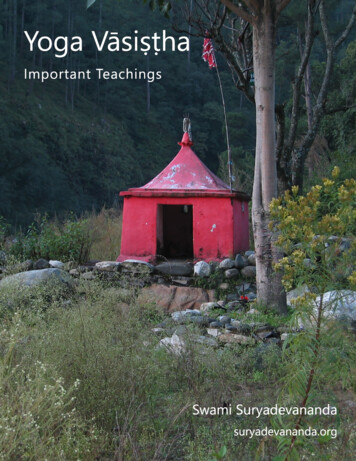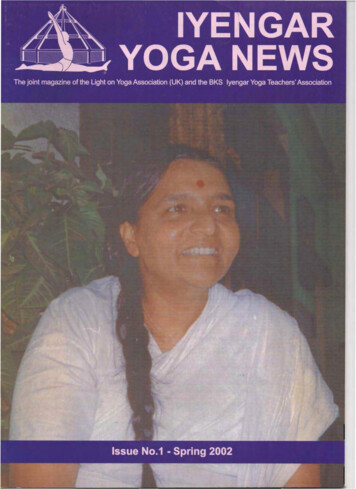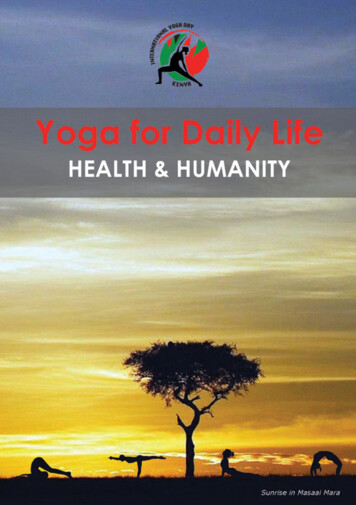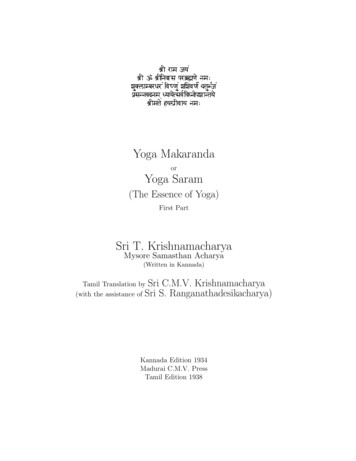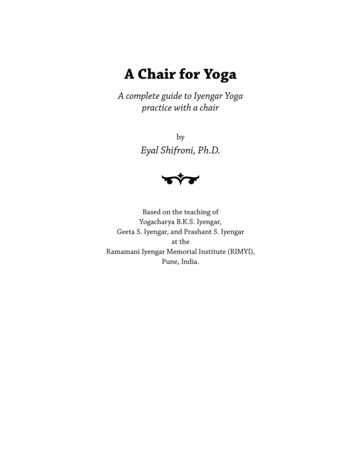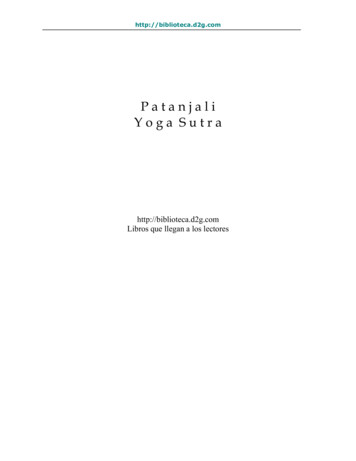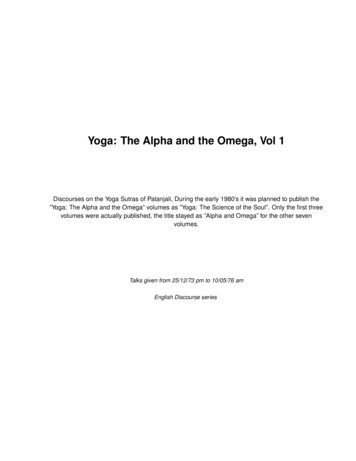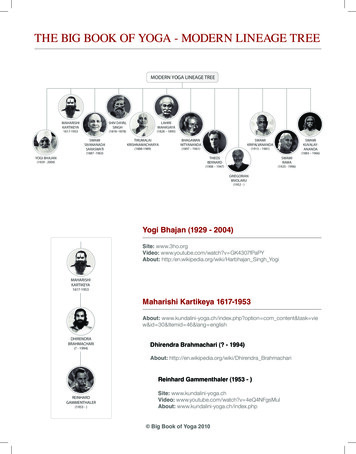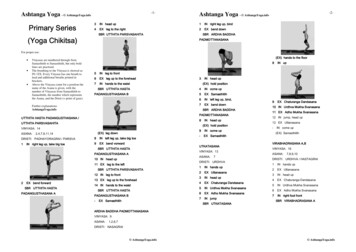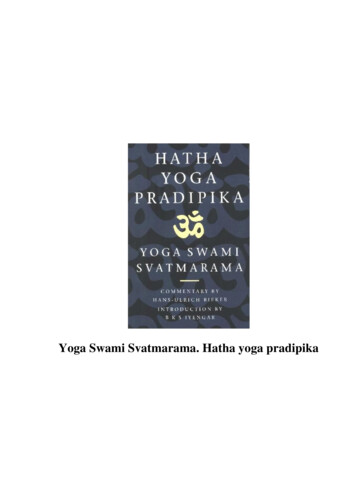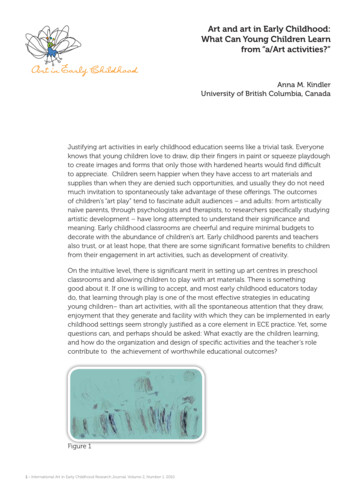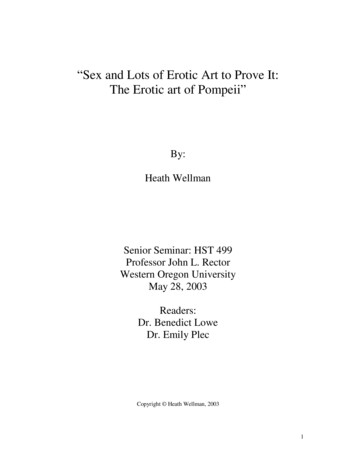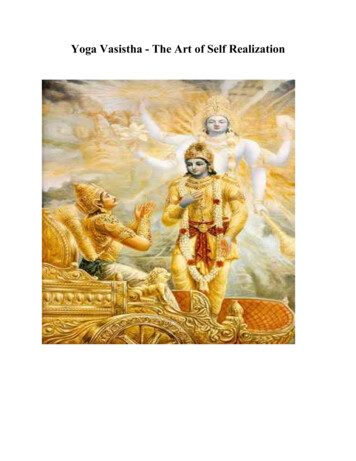
Transcription
Yoga Vasistha - The Art of Self Realization
Yoga Vasistha - The Science of Self RealizationPREFACEOne of the greatest spiritual classics ever recorded, the Yoga Vasistha is a mind blowing account of adetailed conversation between Sri Rama and his Spiritual teacher Vasistha Maharshi. The book goes intogreat detail surrounding the subtle intricacies of the mind, unraveling the multitude of layers to our veryexistence along the way.Much of the text is told through parable stories, which hold many hidden depths within them. The ongoingtheme throughout the book revolves around the notion of worldly miseries being caused by our ownillusion of the world, and how whatever we perceive on the outside is merely a reflection of how we feelinside. Moving beyond these temporary illusions is the path to true enlightenment and Vasistha Maharshigoes into great depth as to how such a journey can be undertaken.Yoga Vasistha contains a system of ancient philosophical thought unique in its kind. Those whose mindsare turned away from the worldly desires and have become indifferent towards the objects of this worldand those who are longing for liberation will be really benefited by this book.The nature of the stories and their deep rooted philosophies are designed to open our levels ofawareness, and legend states that those who complete the book will have their spiritual growthsignificantly accelerated. Yoga Vasistha is the essence of all the Hindu Philosophical texts – BhagawadGita, Vedas and Upanishads.The nature of the ParaBrahma, Supreme God consciousness and the methods to attain Self Realizationare vividly described in this book."This Atman (Eternal Self) is certainly different from the body, senses, mind, and prana. It is blissful,supreme, non-dual, permanent, formless, sinless, and pure. The moment this realization comes to you,you are liberated.""If you constantly think of the Atman, your mind will be purified and your ignorance will be uprooted alongwith the past tendencies, just as your ailments will completely disappear by your taking medicine daily.When the mind is pure, you will get unalloyed bliss.""When one realizes the truth of the unity between the Jivatma (soul of man) and the Paramatma (God)whether by instruction from the guru or from spiritual texts, that every moment the source of ignorance,along with the cause and effect, will mingle with Paramatma. The state mentioned above is calledmoksha (liberation). The self is ever-free."[Vasistha to Rama:]When the mind is at peace and the heart leaps to the supreme truth, when all the disturbing thoughtwaves in the mind-stuff have subsided and there is unbroken flow of peace and the heart is filled with thebliss of the absolute, when thus the truth has been seen in the heart, then this very world becomesan abode of bliss. (II:12)Aum Namoh Narayana
Aum Loka Samastha Sukinou BhavantuMay all the beings in all the worlds be happy;Peace, peace and peace be everywhere.Table of ContentsINTRODUCTION . 4What are the four Gatekeepers (Pillars) to Freedom? . 5Inspirational Verses from Yoga Vasistha . 7The Story of HastAmalaka . 8Para Pooja . 9Rama and Dispassion . 10Story of Suka – How Suka attained the Highest State of Bliss. 13What are the impediments of Yoga? How to abandon them? . 15Eight limbs of Meditation . 15Greatest Verses from Yoga Vasistha . 16Story of Lila . 24Story of Son of Indhu (Moon) . 32The Story of deceitful Indra . 33Story of Karkati . 37Story of King Janaka . 45Story of Bali . 49Story of Prahlada . 52Story of Gadhi . 56Story of Uddalaka . 60Story of King Bhageeratha . 65Story of Bilwa fruit. 67Story of King Sikhidwaja . 68The Story of Kacha . 85Story of Bhringisara . 86Story of King Ikshwaku . 88The Story of Muni and a Hunter . 91The Conclusion of NirvAna Prakarana . 93SUMMARY OF THE YOGA VASISTHA . 98What is Sri Satya Narayana Homam or Puja? . 121Sri Satyanarayana Swamy Story 1 . 121Sri Satyanarayana Swamy Story 2 . 122Sri Satyanarayana Swamy Story 3 . 123
Sri Satyanarayana Swamy Story 4 . 124Sri Satyanarayana Swamy Story 5 . 124INTRODUCTIONTHE YOGA-VASISTHA is a popular text on Non-dual God, Ancient in form and philosophical in content. Itis also known by other names like Knowledge Vasistha, Maha Ramayana, Vasistha Ramayana andVasistha and is ascribed to Sage Valmiki himself. It is in the form of replies given by Vasistha to SriRama's queries regarding philosophical problems of life and death, and human suffering, and treats theessentials of Advaita Vedanta.Yoga Vasistha, written by Sage Valmiki, is the spiritual teaching imparted by Sage Vasistha to Sri Rama.Yoga Vasistha is also known as the Maha Ramayana, the Uttar Ramayana and the Vasistha Ramayana.It describes how Rama’s knowledge, wisdom and understanding evolved and progressed throughout thedifferent stages of his life. Yoga Vasistha is an elaborate work, consisting of 32,000 verses and 64,000lines.The main theme of Yoga Vasistha is that the soul is undergoing a dream from which it must awake. Thisdream represents our association and identification with the world. The fact that it is described as being adream means that whatever is in it has to be false. Nothing in a dream can be true. Waking up from thatdream is the ultimate goal, Self-realization. People who are interested in Self Realization can also studythe more comprehensive Brihat Yoga Vasistha book and the smaller one, Laghu Yoga Vasistha. The termBrihat means great, while Laghu signifies small.The sum total of pleasures of the whole world is a mere drop when compared to the bliss of Moksha.When all the desires are destroyed, the extinction of the mind where Mind becomes “No-Mind” isMoksha. If the illusory I-ness or Ego perishes, the end of thoughts to the Maya is Moksha. Extinction of allPsychological conditioning constitutes Eternal Liberation of the Self. Self Knowledge is the realization thatthe Self is in reality not bound, but always pure and free. Realize that you are the immortal all pervadingSelf and become free. This is the goal of our life and the goal of our existence.The book deals with six major sections – 1. Dispassion or indifference 2. Longing for liberation 3. Origin 4.Preservation 5. Quiescence of mind 6. LiberationThere are four gate-keepers at the entrance to the Realm of Freedom. They are Santi (self-control orquietness of mind), Vichara (spirit of inquiry), Santosha (contentment) and Satsanga (goodcompany). The wise seeker should diligently cultivate the friendship of these, or at least one of them.
This World-appearance is a confusion, even the blueness of the sky is an optical illusion. I think it is betternot to let the mind dwell on it, but to ignore it. (1:3)OM Namo NarayanayaWhat are the four Gatekeepers (Pillars) to Freedom?[Vasistha:]There are four gate-keepers at the entrance to the Realm of Freedom. They are Santi (self-control orquietness of mind), Vichara (spirit of inquiry), Santosha (contentment) and Satsanga (goodcompany). The wise seeker should diligently cultivate the friendship of these, or at least one of them.When the mind is at peace, pure, tranquil, free from delusion or hallucination, untangled and freefrom cravings, it does not long for anything nor does it reject anything. This is self-control orconquest of mind.All that is good and auspicious flows from self-control. All evil is dispelled by self-control. No gain, nopleasure in this world or in heaven is comparable to the delight of self-control. The delight oneexperiences in the presence of the self-controlled is incomparable. Everyone spontaneously trusts him.None (not even demons and goblins) hates him.Self-control, O Rama, is the best remedy for all physical and mental ills. When there is selfcontrol, even the food you eat tastes better, else it tastes bitter. He who wears the armour of selfcontrol is not harmed by sorrow.He who even while hearing, touching, seeing, smelling and tasting what is regarded as pleasant andunpleasant, is neither elated nor depressed — he is self-controlled. He who looks upon all beings withequal vision, having brought under control the sensations of pleasure and pain, is self-controlled. He whothough living amongst all is unaffected by them, neither feels elated nor hates, even as one is duringsleep — he is self-controlled.Inquiry (the second gate-keeper to liberation) should be undertaken by an intelligence that has beenpurified by a close study of the scripture, and this inquiry should be unbroken. By such inquiry theintelligence becomes keen and is able to realize the supreme; hence inquiry alone is the best remedyfor the long-lasting illness known as samsara (repeated births).ValmikiThe wise man regards strength, intellect, efficiency and timely action as the fruits of inquiry.Indeed kingdom, prosperity, enjoyment, as well as final liberation, are all the fruits of inquiry. Thespirit of inquiry protects one from the calamities that befall the unthinking fool. When the mind has been
rendered dull by the absence of inquiry, even the cool rays of the moon turn into deadly weapons, and thechildish imagination throws up a goblin in every dark spot. Hence, the non-inquiring fool is really astorehouse of sorrow. It is the absence of inquiry that gives rise to actions that are harmful to oneself andto others, and to numerous psychosomatic illnesses. Therefore, one should avoid the company of suchunthinking people.They in whom the spirit of inquiry is ever awake illumine the world, enlighten all who come into contactwith them, dispel the ghosts cre
Yoga Vasistha is an elaborate work, consisting of 32,000 verses and 64,000 lines. The main theme of Yoga Vasistha is that the soul is undergoing a dream from which it must awake. This dream represents our association and identification with the world. The fact that it is described as being a dream means that whatever is in it has to be false. Nothing in a dream can be true. Waking up from that .File Size: 1MBPage Count: 125People also search forrustica hardware barn doorsyoga vasishta bookwhat is yoga free pdfyogakasha name in englishagricultural barn door hardwareyoga vasistha pdf englishExplore furtherYoga Vasishta Sara - Sage Sri Ramana Mahrashisageramana.orgDownload the Yoga-Vasishtha - Arsa Ramayana PDF ebookholybooks.comVasistha's Yoga (translated by swami Venkatesananda, read .archive.orgYoga Vasistha - Wikipediaen.wikipedia.orgThe Yoga Vasishtha - Divine Life Societydlshq.orgRecommended to you based on what's popular Feedback
